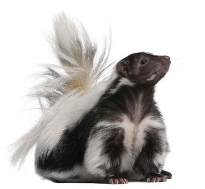
The recent “cool” nights have sparked the search for a snug winter home for many of the VARMINTS in our area. The word varmint is a term used by most Americans for a troublesome wild animal, such as coyote, fox, mink, raccoon, snake, weasel, skunk, and opossum. These “varmints” are viewed unfavorably because they can cause harm to our livestock, as well as domestic animals.
While OUR main focus of elimination tends to be Peppy LePew (the stinky black and white kitty), we do hunt and eliminate, with a vengeance, any and every opossum that we might catch a glimpse of. I can’t tell you how many times I see the plea on social media to not harm this common marsupial mammal that is usually active at night. It’s an expert climber that has a tail that can wrap around and grasp objects like tree branches. Why do we despise them? No, it’s not because they have a strange appearance, it’s because they can be detrimental to our equine family.
Opossums are the definitive host for a parasite S. neurona. The opossum
becomes infected by scavenging on intermediate hosts (the carcasses of other varmints). Once ingested, the parasite matures, breeds, reproduces in the opossum’s small intestine, which sheds in the opossum’s feces. These sheds contaminate the environment and infect incidental hosts like horses.
This parasite, a protozoal microorganism causes Equine Protozoal
Myeloencephalitis (EPM), a progressive and potentially fatal neurologic disease in horses. EPM was first recognized in the mid to late 1960’s but scientists weren’t able to identify the single-celled parasite until 1974. And while it’s been almost 50 years since, there still isn’t a cure, only experimental treatments … some successful and some not so much!
Horses with EPM show signs consistent with spinal cord injury; incoordination, gait abnormalities, muscle weakness and atrophy. They can also show signs of abnormal airway function with difficulty swallowing, abnormal behaviors and even seizures. These signs can come on acutely and have an insidious onset. I can speak from personal experience, EPM is a devastating disease for your equine partner which is why we do everything in our power to prevent a reoccurrence on our farm.
Be sure to click on the following link (from our archives) for suggestions to deter any other unwanted fall varmints:
https://summitcountyfarmbureau.org/2017/11/01/mi-casa-es-not-su-
casa-when-you-are-a-skunk-10-quick-tips-to-repel-the-most-common-
unwanted-fall-visitors-by-michelle-riley-horticulturist-neohiogarden-
com/
EPM information gathered from Stacey Oke, DVM, MSc